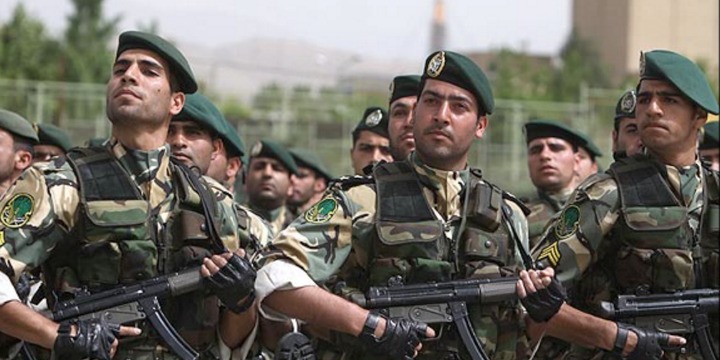Israel Unhappy With Extended Russia-US Deal in Syria, Will ‘Stand Firm’ in Opposing Iranian Military Presence
 by Ben Cohen
by Ben Cohen


Iranian special forces soldiers deployed in Syria. Photo: Al-Masdar news agency.
Israel has signaled its unease with the extension of the ceasefire deal in southwestern Syria brokered by Russia and the US, making clear it reserves the right to carry out airstrikes and other measures to counter Iran’s growing military presence near the Jewish state’s borders.
At the Israeli cabinet’s weekly meeting on Sunday, Prime Minister Benjamin Netanyahu did not address the new arrangements, which build upon an earlier Syrian ceasefire agreed in July. That deal was explicitly opposed by Israel at the time, based on concerns — borne out by developments on the ground over the summer — that Iran and its proxies, like the Lebanese Shia terrorist organization Hezbollah, would fill the vacuum in Syrian territories liberated from ISIS. Israel is also worried about the proximity of Russian forces to its northern border.
One Israeli minister, Tzachi Hanegbi, did voice criticism of the extended ceasefire, telling reporters in Jerusalem that the deal — announced last week following a joint statement issued by US President Donald Trump and Russian leader Vladimir Putin — “does not meet Israel’s unequivocal demand the there will not be developments that bring the forces of Hezbollah or Iran to the Israel-Syria border in the north.”
“There’s reflection here of the understanding that Israel has set red lines, and will stand firm on this,” Hanegbi said.
Israel has reportedly carried out over 100 airstrikes on Iranian and Hezbollah weapons convoys in Syria since 2012, including a Nov. 2 attack on a facility near Homs, north of Damascus, where it was believed rockets were being manufactured.
The aim of the extended ceasefire is to consolidate Syria’s “de-escalation zones” by separating rival armed groups from each other. However, no moves are afoot to secure the withdrawal of foreign forces from the country, which means that Iranian or Hezbollah forces will be as little as 4 miles from Israel’s border on the Golan Heights.
According to Israeli sources, this is what the "buffer zone" separating #Israel from Iranian proxies could look like in southern #Syria following the US-Russia-Jordan agreement pic.twitter.com/OHCGCRSgZf
— Prime Source (@PrimeSourceME) November 13, 2017
A US State Department briefing on the ceasefire on Saturday barely addressed Israel’s substantive objections, save for acknowledging that Iran and its proxies “have used the Syrian conflict over the last five years to increase their presence in this part of Syria, which has undermined the ceasefire and poses a threat to Jordan and Israel.”
A State Department official who spoke anonymously made clear that the primary aim of the extended ceasefire was to secure the “final defeat” of ISIS, as agreed by Trump and Putin during their meeting at last week’s ASEAN Summit in Vietnam. The official added that the “bottom-line principle is that all foreign terrorists and militia fighters must leave these areas and ultimately leave Syria altogether,” including those controlled by Iran, but also emphasized that securing this outcome was the task of the Russians, who “have agreed to work with the Syrian regime to remove Iranian-backed forces a defined distance from opposition-held territory as well as the borders of the Golan in Jordan.”
On Monday, Assad’s regime accused the US and its allies in the Syrian Democratic Forces (SDF) of carrying out “new bloody massacres” in the former ISIS strongholds of Raqqa and Deir ez-Zor. According to a regime statement reported by RT, the Russian government’s international mouthpiece, “the Syrian government remains firm in their ‘suspicion’ that the US-led bombing campaign, and its support for opposition groups on the ground, are coordinated campaigns to help ISIS terrorists attack government forces.”
 Iran Sentences Rapper Toomaj Salehi to Death Over 2022-23 Unrest
Iran Sentences Rapper Toomaj Salehi to Death Over 2022-23 Unrest Netanyahu: ‘Antisemitic Mobs Have Taken Over Leading U.S. Universities’
Netanyahu: ‘Antisemitic Mobs Have Taken Over Leading U.S. Universities’ U.S. Decides Against Sanctions on IDF’s Netzah Yehuda Battalion
U.S. Decides Against Sanctions on IDF’s Netzah Yehuda Battalion Israel Says It Is Poised to Move on Rafah
Israel Says It Is Poised to Move on Rafah Israeli Hostage Hersh Goldberg-Polin Seen Alive in a New Hamas Video
Israeli Hostage Hersh Goldberg-Polin Seen Alive in a New Hamas Video Palestinian Prime Minister Announces New Reform Package
Palestinian Prime Minister Announces New Reform Package France: Man Suspected of Abducting, Raping Jewish Woman ‘to Avenge Palestine’
France: Man Suspected of Abducting, Raping Jewish Woman ‘to Avenge Palestine’ Israel Intensifies Strikes Across Gaza, Orders New Evacuations in North
Israel Intensifies Strikes Across Gaza, Orders New Evacuations in North Iran Threatens to Annihilate Israel Should It Launch a Major Attack
Iran Threatens to Annihilate Israel Should It Launch a Major Attack ‘Completely Baseless’: Reports of Mass Graves at Gaza Hospitals are False, IDF Says
‘Completely Baseless’: Reports of Mass Graves at Gaza Hospitals are False, IDF Says



 Israeli Hostage Hersh Goldberg-Polin Seen Alive in a New Hamas Video
Israeli Hostage Hersh Goldberg-Polin Seen Alive in a New Hamas Video Israel Says It Is Poised to Move on Rafah
Israel Says It Is Poised to Move on Rafah U.S. Decides Against Sanctions on IDF’s Netzah Yehuda Battalion
U.S. Decides Against Sanctions on IDF’s Netzah Yehuda Battalion Netanyahu: ‘Antisemitic Mobs Have Taken Over Leading U.S. Universities’
Netanyahu: ‘Antisemitic Mobs Have Taken Over Leading U.S. Universities’ Iran Sentences Rapper Toomaj Salehi to Death Over 2022-23 Unrest
Iran Sentences Rapper Toomaj Salehi to Death Over 2022-23 Unrest